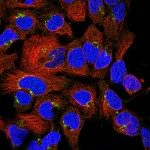Lien vers Pubmed [PMID] – 25996400
Prion 2015 Mar;9(2):125-35
Transmissible spongiform encephalopathies (TSEs) are a group of neurodegenerative diseases caused by the misfolding of the cellular prion protein to an infectious form PrP(Sc). The intercellular transfer of PrP(Sc) is a question of immediate interest as the cell-to-cell movement of the infectious particle causes the inexorable propagation of disease. We have previously identified tunneling nanotubes (TNTs) as one mechanism by which PrP(Sc) can move between cells. Here we investigate further the details of this mechanism and show that PrP(Sc) travels within TNTs in endolysosomal vesicles. Additionally we show that prion infection of CAD cells increases both the number of TNTs and intercellular transfer of membranous vesicles, thereby possibly playing an active role in its own intercellular transfer via TNTs.

